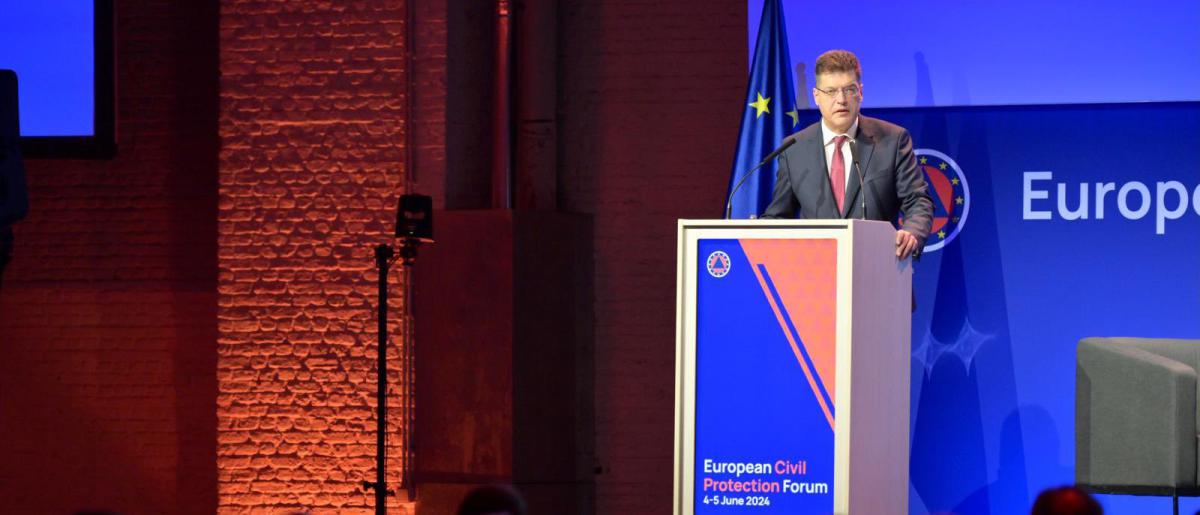Today and tomorrow, the European civil protection community will discuss lessons learned and ways forward in civil protection during the 8th edition of the European Civil Protection Forum.
The European Commission is organising this conference under the theme of shaping a disaster-resilient Union: charting a path for the future of European civil protection. The event will be a timely opportunity to look back at what has been achieved by the EU Civil Protection Mechanism, and to generate ideas for development, innovation and collaboration in the field of disaster risk management going forward.
The Civil Protection Forum offers an opportunity for experts to discuss the latest evaluation on the EU Civil Protection Mechanism (UCPM). The evaluation, adopted by the European Commission on 29 May 2024, shows that a more coordinated response across different sectors and levels will be needed in the face of the increasing number, and severity, of complex emergencies.
The evaluation, which was presented at the Civil Protection Forum today by Crisis Management Commissioner Janez Lenarčič, found that the EU’s Emergency Response Coordination Centre – its crisis hub – is best placed to coordinate disaster management for effectively supporting and complementing the efforts of Member States in prevention, preparedness, and response.
In addition, the evaluation showed that rescEU, which is the EU’s own reserve of equipment and supplies to respond to disasters, is an effective and efficient EU tool to bolster the EU’s resilience.
However, the evaluation also raised concerns that the UCPM’s flexibility might not be sufficient to address new needs and developments going forward, with disasters becoming ever more frequent and complex. Climate change exacerbates this trend.
The European Commission has worked hard to build up its prevention, preparedness and response capacities to ensure that Europe is ready for a more unpredictable future. Looking forward, it is crucial Europe builds on the lessons learnt and continues to strengthen its civil protection capacities. This is the only way to keep people safe.
Commissioner for Crisis Management, Janez Lenarčič, said: “The EU Civil Protection Mechanism has ensured that citizens could count on emergency assistance when they needed it most. However, with disasters becoming more frequent, intense, and complex, it is time to look at how Europe’s disaster management works and how it can be strengthened. Unprecedented dangers call for unprecedented action. Let us use this Civil Protection Forum to come together and innovate, collaborate and share good practices on emergency prevention, and response. It is only by responding together that we can continue to make a difference.”
Background
The EU’s Civil protection Forum takes place in Tour & Taxis from 4-5 June and brings together experts, policy makers, first responders, scientists and the private sector.
EU Civil Protection Mechanism
When an emergency hits, any country can request assistance via the EU Civil Protection Mechanism. Once activated, the EU’s Emergency Response Coordination Centre coordinates and finances assistance made available by EU Member States and 10 additional Participating States (Albania, Bosnia and Herzegovina, Iceland, Moldova, Montenegro, North Macedonia, Norway, Serbia, Türkiye and Ukraine) through spontaneous offers.
The UCPM has been activated 520 times between 2017 and 2022. Recent innovations have been introduced to cope with evolving demands, such as logistical hubs to ensure that support, such as transport, logistics and private donations, reached Ukraine in a rapid and efficient manner.
Evaluation
The European Commission adopted the Communication on the evaluation of the EU Civil Protection Mechanism accompanied by a Staff Working Document. Following an initial interim evaluation of the UCPM in 2017, the European Commission conducted an independent evaluation of all actions carried under the UCPM in EU Member States and Participating States between January 2017 and December 2022 and the Evaluation analysed these 5 years of the operations of the UCPM.



